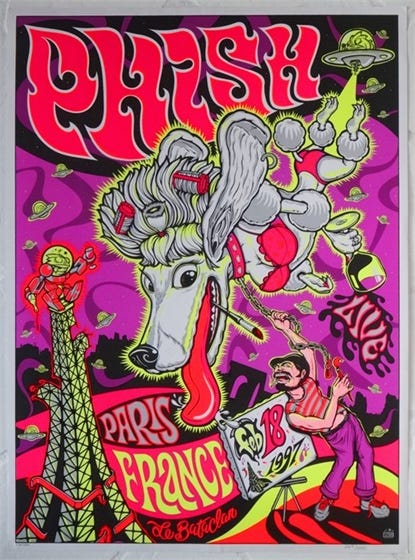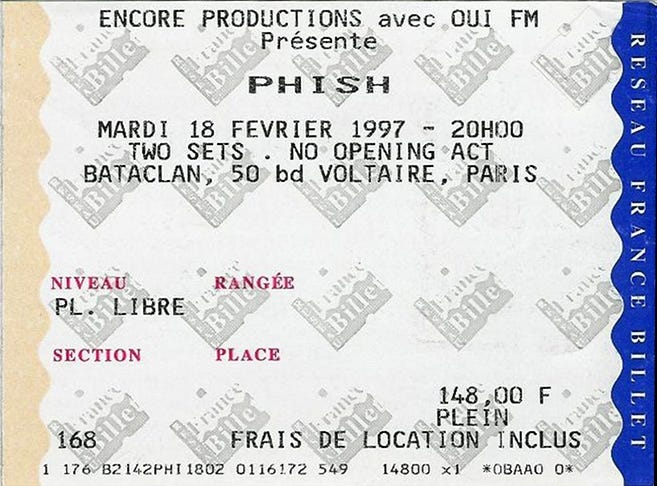SET 1: Beauty of My Dreams > Cavern > Punch You in the Eye > Runaway Jim > NICU > Stash, Waste, Walfredo, Character Zero > Slave to the Traffic Light
SET 2: Peaches en Regalia > Also Sprach Zarathustra > My Soul > Maze, Wolfman's Brother > Reba, Train Song, Harry Hood > Frankenstein
ENCORE: Bold As Love
I got a little hyperbolic yesterday — if you don’t like hyperbole, you may want to unsubscribe until next year…or maybe 2025, to be safe. But today, I’m going to walk back my take that 2/17 contained all the multitudes of 1997. There’s one important element still missing from the band’s miraculous transformation, though it may be present, just not yet fully audible. I’m talking about Mr. Michael “Soft G” Gordon.
Over the course of this project, I’d wager I mention Mike the least. He’s the most consistent member of the band, which can be both good and bad. Certainly, at this point in Phish history, he’s the least flashy member: there are Trey solos and Page solos and Trey/Fish duels and Fishman features, but Mike’s bass only takes center stage in the rare moments set aside for him in songs such as YEM or Weekapaug. Mike was also a much more timid player in the early-to-mid 90s, playing the Entwistle role of the steady hand surrounded by much flashier egos. He’s sneaky in the ways that he can influence a jam, but reluctant to take the driver’s seat for more than brief turns.
Then again, some of that could just be the imperfect sonic bias of the historical record. Bass guitar is the instrument most poorly served by the average audience recording, and it’s easy to miss Mike’s contributions beneath the better-represented high end. It’s also hard to tell how much of it was the taper and how much of it was the room mix; after all, 1997 was the year of People For A Louder Mike (PLM), the fan movement for Paul to turn up Cactus on his board. It seems to have been an effective campaign, as by the end of the year Mike is more featured than ever before, and his stature within the band has only grown since.
But the clamor of PLM was secondary to a more direct and technical change: Mike’s decision to switch from his Languedoc bass to the Modulus. It won’t happen for another week and a half, in the Hamburg show that would beget Slip Stitch and Pass. But it was another adjustment initially triggered by the more intimate environments of Europe that stuck around for the long run:
“Since we were in a club rather than an arena, I decided to switch basses and picked up my Modulus,” Mike says in The Phish Book. “All of a sudden even the low notes had great definition — not all the low notes on the B string, but most of the low notes I play a lot. It sounded great, with an attack I hadn’t been able to get before.”
We’ll get to that show in due time; tonight, in Paris, it’s interesting to note its absence. Though the tapes from this European run have been excellent, this one doesn’t do Mike any favors – he’s swamped in the mix by his three peers. So I’m probably missing some of his contributions, particularly since yesterday’s Amsterdam SBD revealed multiple turns in the immense second set that were ever so slightly nudged into existence by a Mike key shift or discordant sidebar. But while there are a couple excellent jams in this show, Stash and Hood chief among them, they’re not nearly as fresh-sounding as the night before. And I think Mike’s more passive role has something to do with that.
It’s most noticeable in comparing tonight’s Wolfman’s Brother to the next, the breakthrough in Hamburg. It’s a bit unfair to compare AUD to SBD, and I naturally don’t have the same ear that Mike has for the difference in his instruments. But on the Slip Stitch and Pass Wolfman’s, it’s clear that something is going on with Mike that the entire band recognizes, because they clear out the space for him to thrive. When the whole band pulls back for the last four minutes, inventing cowfunk on the fly, you can hear Mike more clearly than ever, throwing in slappy fills around Trey’s wah-rhythm and Page’s itchy clavinet. Suddenly, after 14 years, the groove has been officially shared.
Jumping back to Bataclan, this Wolfman is much more tame. There’s roughly a minute (5:03 - 6:17) where they ease up enough to get in the ballpark of the Hamburg version, but it’s fleeting. Mike, to the extent that we can hear him, remains a supporting player to a busier Trey lead. It’s strange that it took Phish so long to crack the song, and the issue might just be a matter of temperament — they just try to do too much, not trusting the song’s deep pocket to do the heavy lifting. When they finally do, they’ll find a taciturn bass player hiding in there, holding a new instrument and ready to play a critical role in the band’s new sound.



